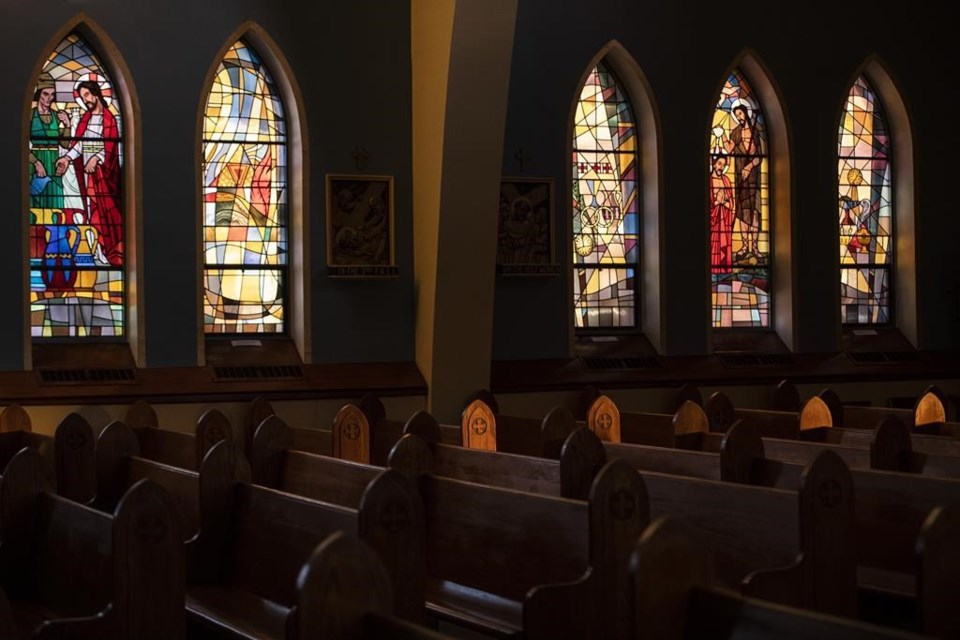TORONTO — Several Ontario religious organizations are requiring staff and volunteers at places of worship to be fully vaccinated against COVID-19 while encouraging members of their congregations to get their shots.
The province's vaccine certificate system – which kicked in last month and requires proof of a shot to access certain venues – does not cover places of worship.
In London, Ont., the Diocese of Huron decided to mandate COVID-19 vaccination for anyone working at its churches. The policy applies to priests, pastors and volunteers, as well as those who greet people at church doors and help with readings.
At St. Aidan's Anglican Church, which is part of the diocese, the mandate applies to about 100 of the congregation's 120 members, said Canon Kevin George.
The vaccine mandate does not apply, however, to everyone attending a service because the Diocese of Huron didn't want to exclude anyone from public worship, George said. He's nonetheless encouraging congregation members to get vaccinated.
"I've also asked those with an ideology that's opposed to vaccination to consider whether being in public worship is the right thing for them to do, given that they follow in the way of Jesus, who says: 'Love your neighbour,'" George said.
"Clearly, putting your neighbour in danger because of your lack of vaccination is not in keeping with that teaching."
The Diocese of Toronto has introduced a similar policy requiring clergy, employees and volunteers to show proof of vaccination.
Several mosques have also come out with vaccine mandates for staff.
Masjid Toronto, an Islamic organization that runs two mosques in the city, has asked all workers to be fully immunized, including imams, facility managers and volunteers, but has stopped short of asking those coming for prayers to show proof of vaccination.
"We require the whole staff to be vaccinated," said manager El-Tantawy Attia.
Refaat Mohamed, president of the Canadian Council of Imams, said most mosques and Islamic schools across Ontario are now requiring staff to be fully vaccinated.
But he said mandating proof of vaccination for all people coming to places of worship isn't easy because those venues are meant to welcome everyone.
"We cannot stop people to come into the (mosques)," he said. "We are recommending that all people who come to the mosque, it is better that they are vaccinated, so that they can avoid any infection or any problem or spreading the disease."
Rufaida Mohammed, the community co-chair of the Canadian Muslim COVID-19 Task Force, said her group recently issued a proof-of-vaccination implementation plan for mosques that she says can help them decide whether to bring in vaccine mandates.
The plan cites the spread of COVID-19 variants, the reopening of schools and increased indoor gatherings during the colder months as reasons to require proof of vaccination.
"Making our mosques safer will make it easier for the elderly and most vulnerable to attend, who previously were not permitted or were fearful of attending," it reads. "This will also reduce the risk of service interruptions due to outbreaks and potentially prevent lockdowns or allow for reduced restrictions down the line."
Mohammed said her group is encouraging mosques to implement the plan but isn't forcing it on anyone.
"We wouldn't be calling up or doing spot checks at local mosques," she said. "It's really about informing."
At the Temple of Israel in London, a COVID-19 vaccine mandate applies to anyone entering the building.
Jason Mandlowitz, the president of the temple, said individuals need to show proof of full vaccination and also follow other public health guidelines, such as wearing a mask.
The temple is streaming all its services online, he said, but adopted a hybrid approach during recent Jewish holidays.
"We did the service virtually from our small rooms in the building and then we did two outside," he said.
"Coming into the building, we had our rabbi, we had two tech people to help us do the livestreaming, and we had a choir of nine people. All of those people had to observe the rules."
This report by The Canadian Press was first published Oct. 6, 2021.
Maan Alhmidi, The Canadian Press

